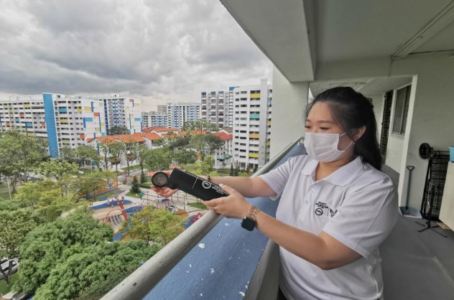Innovations in public health and sustainability pave the way for a better living environment.
My husband and I aspire to give our child the best—not in terms of material wealth, but by prioritizing family time, home-cooked meals, and the joy of sharing dad (or mom) jokes. However, as the prices of HDB flats soar above a million dollars, our dreams have been tempered by the reality of finding an ideal home.
We’ve set our sights on owning a flat in Tampines, which we believe is one of the best towns in Singapore. This isn’t a controversial opinion; it’s near my parents in Bedok, the Downtown Line can whisk us to our workplaces in just 30 minutes, and there are numerous primary schools with affiliated secondary schools in the area.
Yet, with Tampines seeing its first million-dollar resale HDB flat this September, we worry that our dream may slip away.
Suppressing Dengue for a Safer Neighborhood
Tampines is not just conveniently located; it actively participates in dengue suppression efforts. Dengue fever is endemic in Singapore, and during the last major outbreak in 2020, over 35,000 cases were reported.
The National Environment Agency (NEA) initiated Project Wolbachia to combat the spread of dengue by targeting the female Aedes aegypti mosquitoes, the primary vectors for the disease. Since October 2016, Tampines has been one of the neighborhoods involved in this project, where non-biting male Wolbachia-Aedes mosquitoes are released to mate with the females. The presence of Wolbachia bacteria inhibits the females’ ability to lay viable eggs, ultimately reducing the mosquito population.
Debug, a part of Verily—a precision health company under Alphabet Inc—collaborates with the NEA, utilizing AI-driven technology to automate the breeding, sorting, and release of these mosquitoes.
Yanni Yoong, a Programme Manager at Verily Life Sciences, emphasizes that climate change will exacerbate the conditions for dengue outbreaks, making innovative technologies essential for scaling up mosquito suppression efforts. Since the project’s inception, there has been a remarkable 98% reduction in the dengue mosquito population and a 70% decrease in dengue cases in 2022. Full coverage of male Wolbachia-Aedes mosquito releases was achieved in Tampines in April 2022, reinforcing our desire to settle in this neighborhood.
As nature lovers, my husband and I appreciate Tampines for its proximity to our favorite hangouts like East Coast Park and Changi Boardwalk. We hope our child will develop a love for nature, just like us.
Debug has also established its first off-site mosquito production facility at Techlink in Kaki Bukit, which allows them to expand their successful efforts in Tampines.
A Clean, Green, and Sustainable Future
Before returning to Singapore in early 2021, my husband and I lived briefly in Bologna, Italy, where sorting household waste into different categories was mandatory. It took some adjustment, but it became a part of our routine.
Recycling is not unique to Italy; it’s also growing in Singapore. Starting in mid-2024, consumers will pay a deposit on metal and plastic pre-packaged beverages, which can be refunded upon return. This Beverage Container Return Scheme (BCRS) will feature automated and reciprocal recycling bins known as reverse vending machines (RVMs) that collect used containers and refund deposits.
TOMRA, a Norwegian company, invented this technology, and CK Chai, their Director of Business Development in Singapore, shares that they are not merely selling machines but are instead focused on supporting the BCRS holistically.
TOMRA aims to educate the community about plastic waste pollution and recycling, and they opened a resource transformation center in Techplace I at Ang Mo Kio to promote these efforts.
CK explains that Singapore is the first country in Asia to launch such a comprehensive deposit return scheme, but successful implementation requires understanding local consumption habits. “In Western countries, consumers tend to shop for groceries once a week. In Singapore, people shop more frequently at malls and hawker centers, so we need a return scheme that reflects this behavior.”
Despite the challenges, CK is optimistic about the BCRS’s potential to contribute to Singapore’s zero-waste goal.
A Long Journey Ahead
Both Debug and TOMRA are on paths toward a common goal: to create a better living environment. While my husband and I are budgeting for a smaller, more affordable flat in our chosen neighborhood, these companies are committed to ensuring their technologies effectively address public health and environmental issues.
“I often walk around nearby HDB blocks to observe how waste management operates in the area,” CK says, highlighting the importance of local knowledge in implementing effective RVMs. Similarly, Yanni underscores the need for community engagement in preventing mosquito breeding.
As we take steps toward our dream home, Debug and TOMRA are refining their technologies and empowering residents to participate in these initiatives, making every neighborhood the best it can be.








